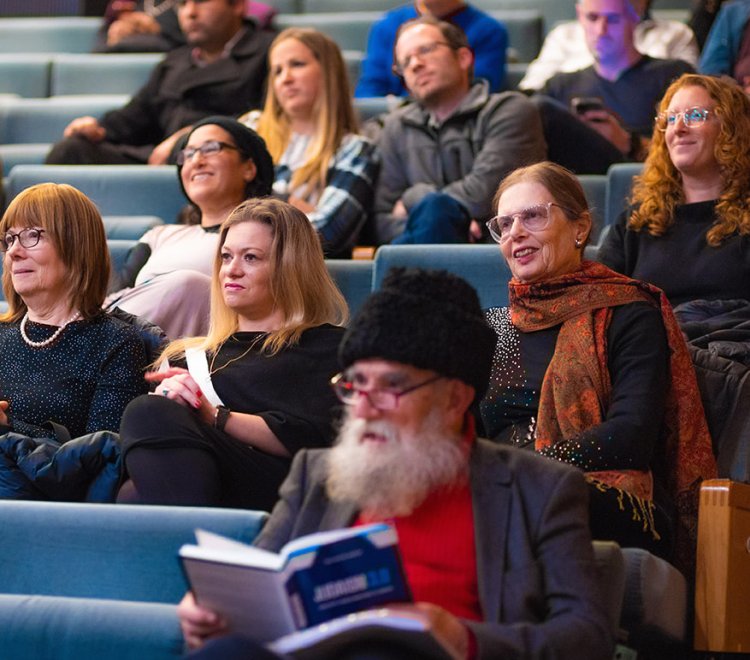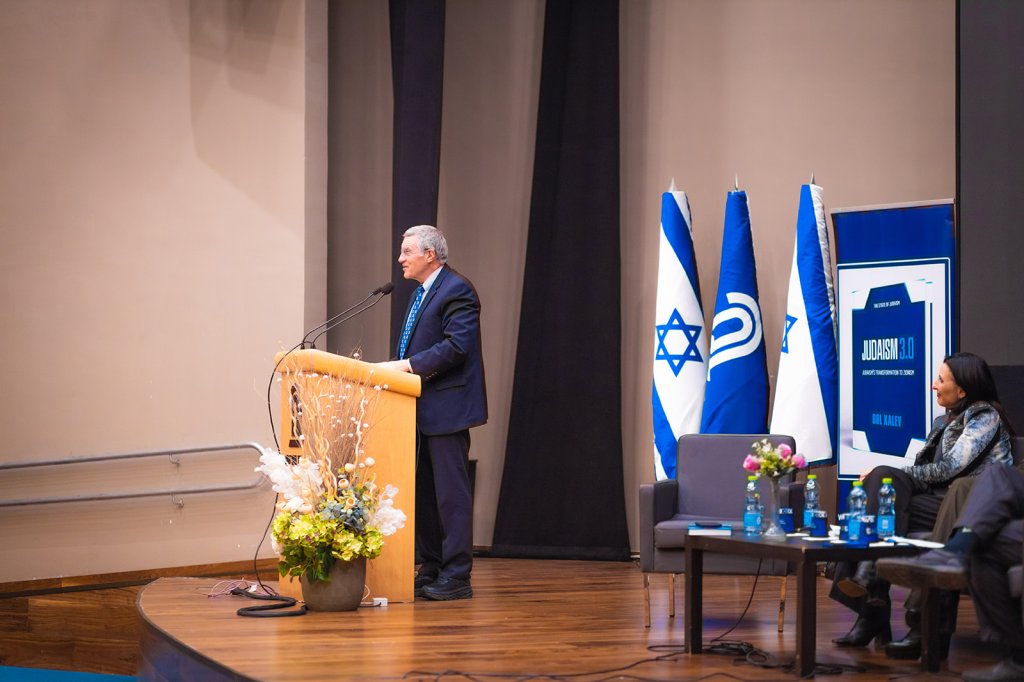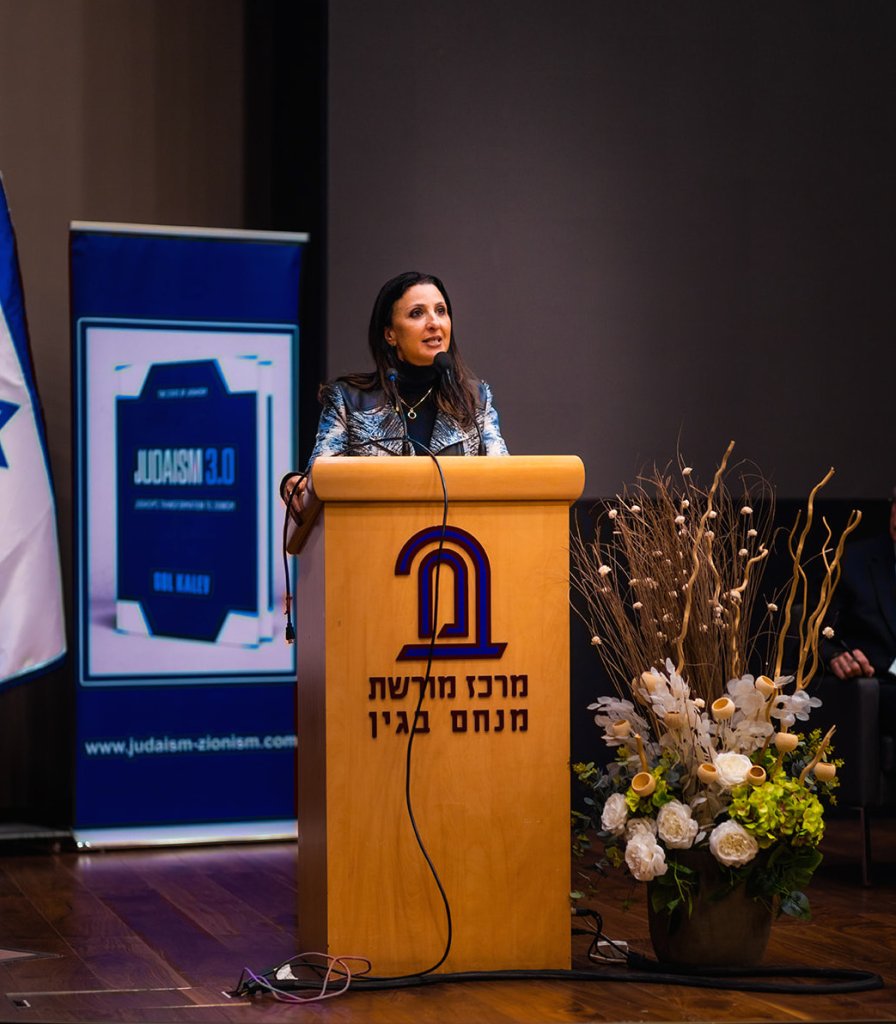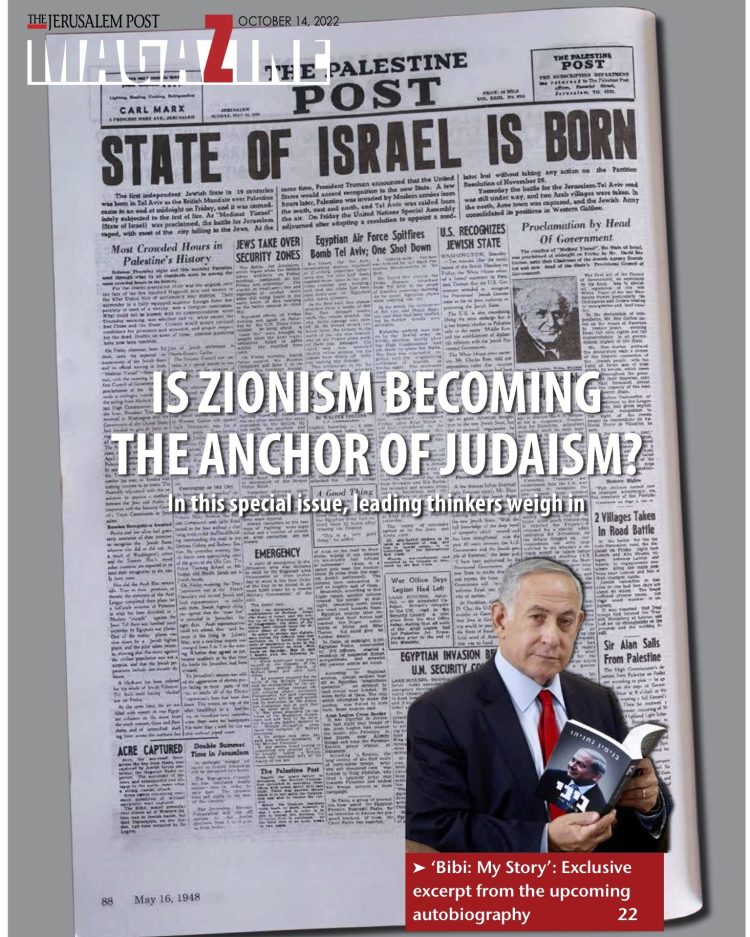Press release: Zionism in the midst of the nationalism-universalism debate
The Begin Center hosted its third discussion of Gol Kalev’s new book, Judaism 3.0, with Dr. Einat Wilf, Jerusalem deputy mayor Fleur Hassan-Nahoum and the author. The event was moderated by CBN News Middle East Bureau Chief Chris Mitchell
Jerusalem, February 17, 2023, for immediate release; full video of the event: YouTube

Gol Kalev’s groundbreaking book, Judaism 3.0 – Judaism’s Transformation to Zionism, continues to trigger conversations. Last week, the Begin Center hosted its third Judaism 3.0 event, which started with an Israeli wine reception and continued with a panel discussion focusing on how the book’s thesis, that Zionism is becoming the anchor of Judaism, relates to the global debate between nationalism and universalism.
Kalev argued that every era has its defining global ideological divide. In the 21st Century it is emerging to be between Americanism and Europeanism: “Americanism is about nationalism, particularity, religiosity and faith – one nation under God. Europeanism evolved over the last few decades to become the exact opposite: universalism, post-nationalism, multi-nationalism and zealous secularism…French President Macron said it succinctly: Nationalism is a betrayal of patriotism.”
Kalev said that the Americanism-Europeanism divide is not felt on a day-to-day basis, both since naturally there are proponents of Europeanism in America and vice versa, and since “America and Europe are great allies – shared interests are more important than ideological disagreements.” Yet, Zion and Zionism are at the epicenter of this debate – it is the active front in the emerging Americanism vs. Europeanism divide.

Kalev contrasted the bipartisan support in America to move its embassy to Jerusalem with “European countries voting for ludicrous UNESCO resolutions that suggest that Judaism and Christianity have no historic connection to Jerusalem.”
Americanism is a form of abstract Zionism, Kalev argues. The ethos of the return, “the Shiny City Upon a Hill that President Kennedy and President Reagan referenced is inspired by Zion”. Kalev stressed that both the American Revolution and the Zionist Revolution that Herzl incepted were transformative events – an exodus from Europe and its ways of thinking. Such Americanism-Zionism natural bond is in contrast to recent developments in Europe:
“Universalism has become a core European value,” Kalev said. Therefore, Zionism, which is about Jewish particularity, is viewed by some in Europe as nothing less than a negation of Europeanism – a negation of who we are. This Kalev said, is not new since Judaism has always been about particularity – both in its religious and national aspects. What changed is that Zionism is now becoming the anchor of Judaism, so it became the aspect of Judaism that is offensive to Europeans, just like the religious aspect of Judaism was offensive to Europeans, when that was the anchor of Judaism and Europe was religious: “It was viewed by Europeans as a negation of Christianity, which back then was a core European value.”
Kalev placed this in the context of what he called the world’s oldest conflict: “the Israeli-European conflict, that started 2,300 years ago when Europeans – first the Greeks then the Romans – invaded Judea and attempted to negate Judaism and instill their European values of universalism”.

This emerging Americanism vs. Europeanism divide alters the reality for American Jews, who in the past, Kalev claimed, were worried that centering their Jewish identity too closely around Zionism could trigger fears of perceived dual loyalty. “Now it is the opposite”, he argued: With Zionism being intertwined with Americanism – on ideological, historical and geopolitical basis – American Jews’ fear of perceived loyalty issues could get awakened if they keep too much distance from Zionism.
Similarly, such perceived loyalty issues could get triggered if Jews are viewed to be on the “European side” of the Americanism-Europeanism divide, “championing values of universalism, anti-nationalism and extreme secularism in America.” American Jews, he argues, should be natural supporters of Zionism as an outgrowth of being Americans, even before as an outgrowth of being Jewish.
Kalev: “Zion and Zionism are at the epicenter of this debate – it is the active front in the emerging Americanism vs. Europeanism divide.”
Kalev stressed that with the unimaginable innovations coming out of Zion, Zionism had become a light-upon-the-nations. This is reflected even in the way we tackle tough issues, he said. Therefore, Zionism is on the one hand at the epicenter of the nationalism-universalism debate, but on the other “can inspire frameworks to deliberate this debate in a safe and constructive way.”
Dr. Einat Wilf opened her remarks by stating that she agrees with the central premise of Kalev’s book: “Indeed Zionism has become the most successful anchor by which most Jews define their Jewish identity – it is very difficult to be a Jew today without having some position and emotion – whether negative or positive – towards Zionism and the State of Israel.”
Moreover, she argued that Zionism is perhaps the most successful Jewish response to dealing with the question of particularism and universalism in one response.

Wilf explained that Zionism has three parents without which it cannot be understood: The ancient longing of the Jewish people to Zion, the disappointment in the emancipation, and the global transition from empires to nation-states, which she underscored is a universal principle that is about particular nations: “We begin the 20th Century when much of the world is divided between Empires, and end the 20th Century when much of the world is divided between nation-states.”
Only the three of them together bring Israel into being, Wilf stressed, which is why Zionism is at the same time both particular and universal: “It is self-determination of the Jewish people – so particular to the Jews, but it is the universal principle of self-determination. It is based on the particular attachment of Jews to the Land of Israel, but it is based on the disappointment from the universal promise of emancipation.”

Wilf said that while Herzl first believed in the promise of emancipation – that it does not matter that he is a Jew, “he soon realized that as much as Europeans claim to uphold universal ideals, at the end of the day, they are not able to live by those universal ideals, especially when it comes to accepting Jews as equal citizens and fellow members of European nations…In a way, Herzl said to the Europeans: I got you – you have noble ideals, but you can’t walk the walk,” It is that failure, Wilf said, that led Herzl to declare that we are a people, one people. “With that one line Herzl declared a century of emancipation a failure.”
Wilf explained that Zionism had to be a secular movement of self-redemption, that is a modern movement. It is based on the modern idea that people can shape their faith. That is the animated spirit of Zionism.
Wilf reacted to Kalev’s association of Americanism with nationalism, stating that her experience is that Americans do not understand nationalism: “Americans, including sometimes American Jews, think of Israel as a Jewish state as an aberration. They believe in a universal notion of a nation bound by a constitution, entirely blind to the ethnic element of their own nation. They spew the word entho-nationalism as if it is a slur, completely impervious to the idea that most of the world is based ethno-nationalist states – when they are lucky, otherwise they break into civil wars.” And this ethno-nationalist world, Wilf stressed, is based on the American Wilsonian idea of self-determination.
Wilf: “Americans, including sometimes American Jews…spew the word entho-nationalism as if it is a slur, completely impervious to the idea that most of the world is based ethno-nationalist states…which is based on the American Wilsonian idea of self-determination.”
On the other hand, for Europeans, Wilf said, “some of them detest the idea of nationalism, but they never misunderstand it – they might want to put it aside, but they understand what it means, which Americans are completely blind to.”
While agreeing with Kalev about the triumph of Zionism, Wilf had a different take on what to attribute this to: “The reason that Zionism is the only idea left standing is not that it was the better idea in theory. All of the ideas for living as modern Jews made a very strong case – Communism, Bundism, Reform Judaism, emancipation. What happened is the verdict of history. The verdict of history was clear and cruel to all the other ideas, and ultimately it only left Zionism standing, transforming also the Jews of America to Zionists. Zionism is both particular and universalist.”

Deputy Mayor Fleur Hassan-Nahoum who followed, told Wilf “I partially agree with you…This all goes back to Greece vs. Jerusalem, rationality vs. spirituality. And the state of Zionism today is a mixture of both. We did not abandon our rationality, but the spiritual connection to Zion cannot be undermined,” she said, noting that this is the reason we went to Israel and not Uganda, and reminding of the role religious Zionists and Haredi Zionists have played in the Zionist endeavor.
Zionism is derived from Zion which is one of the names of Jerusalem, Hassan-Nahoum underscored. “Jerusalem is a microcosm of everything. It is the center of the universe. It is the convergence of East and West. It is the convergence of the past and present and future. It is the convergence of heaven and earth. We are a city of contradictions in many ways.”
Hassan-Nahoum brought the theoretical discussion to today’s Jerusalem, speaking about what she labeled – the state of Zionism in Zion: ”The majority of the people in Jerusalem are not Zionists,” she proclaimed. “There are 9 million people in Israel, 1 million are in Jerusalem. Forty percent of Jerusalem are East Jerusalem Arabs, 25 percent are Haredi Jews. This is double this rate for the county which has approximately 20 percent Arabs and 12 percent Haredi Jews.”
The deputy mayor stressed that the attitudes of East Jerusalem Arabs towards Zionism and Israel is very different from that of Arabs in Israel. “85pct of those [East Jerusalem] Arabs are studying the same curriculum in schools that is taught in Gaza, which is obsessed with the right-of-return…That one day they will kick the Jews out, and all [refugees] will come back.”
Hassan-Nahoum: “This all goes back to Greece vs. Jerusalem, rationality vs. spirituality. The state of Zionism today is a mixture of both.”
“For the Haredi, there is a Zionist identity, they just don’t call it Zionism, because Zionism is considered a dirty word,” Hassan-Nahoum said explaining that this is because Zionism was brought in through a secular revolution. “We are much more of a religious state than people believe,” she said noting that there is an Israelification of the Haredi community, and that Israelification is Zionism.
“The Arabs are also moving towards Israelification,” she added, noting that the government of Israel and the city of Jerusalem were able to bring that extreme curriculum in East Jerusalem schools from 92 percent to 85 percent, bringing in more students into the curriculum thought to Israeli Arabs instead.
“I agree with Gol in his premise that today the most significant movement in the Jewish world is Zionism,” she said, but qualified that we must focus on the challenges that Zionism faces: “The population of Israel in the next 20 to 30 years will mirror the population of Jerusalem today,” she stated, emphasizing that the state of Zionism today is something that we need to take very seriously: “We can not be apathetic about our Zionist identity. We have to be deliberate, we have to plan, and we have to implement.”





The event proceeded to a panel discussion, followed by Q & A from the audience and from viewers around the world. In response to a question from a Zoom viewer about why Europeans view Jewish nationalism as a negative, while at the same time promote Palestinian nationalism, Kalev shared his conversation with a Catalonian separatist who told him that Catalonia’s primary problem is that they are occupied by Spain and not by Israel. “If we were occupied by Israel, the whole world would be pro-Catalonian, and nobody would have ever heard of Palestine.”
Moderator Chris Mitchell reminded that the next Judaism 3.0 event at the Begin Center will focus on whether anti-Zionism is the new antisemitism. The audience proceeded to informal conversations over Israeli wine.


Photos: Mordechai Daniel
Video: The Menachem Begin Heritage Center
Next event: Is anti-Zionism the new antisemitism (April 30): Register
Press releases of recent events:
Amb. Michael Oren and Gol Kalev discuss Judaism 3.0
From Tel Aviv to Jerusalem – Zionism’s religious revival
Prof. GIl Troy and Gol Kalev debate the thesis of Judaism 3.0
A revolutionary approach to countering Israel-bashing
Watch the full video:
About Judaism 3.0: In this landmark book, Gol Kalev demonstrates how Zionism has turned into the organizing principle of Judaism. Analyzing long-term shifts in Israel, Diaspora Judaism as well as global trends that impact the state of Judaism, Kalev shows how Zionism has become the primary conduit through which both Jews and non-Jews relate to Judaism – in the positive and negative alike. More
Visit the book’s website: Judaism-Zionism.com
Related articles by Gol Kalev: Europe and Jerusalem
Endorsements
“A courageous, compelling, and thoughtful thesis that must be part of any serious discussion of the future of Israel and the Jewish people.”
Michael Oren, historian, former Ambassador of Israel to the United States
“This book should play an important role in the discussions about the future of world Jewry and its relations with Israel.”
Natan Sharansky, former Chairman of The Jewish Agency, former Deputy Prime Minister of Israel
“Gol Kalev does not just know Theodor Herzl – he lives and breathes Theodor Herzl…This book should trigger the conversation the Jewish community needs about Israel, Zionism, Judaism and Identity. Bravo! “
Professor Gil Troy, author – The Zionist Ideas
ייA remarkable ideas book that is about much more than the state of Judaism….One of the most important books about Judaism, Zionism and global trends of our times.”
Catherine Carlton, former Mayor of Menlo Park, Silicon Valley tech entrepreneur
“Gol Kalev’s book has the merit to transform the very essence of the State of Israel to becoming an objective expression of Jewish identity.“
Dr. Georges Yitzhak Weisz, author – Theodor Herzl: A New Reading
“Kalev picks up where Herzl left off……A must read for people of all religious and political backgrounds who want to get a deeper understanding of the state of Zionism and Judaism today.”
Fleur Hassan-Nahoum, Deputy Mayor of Jerusalem
The book was selected by the Jerusalem Report as the cover of its 2022 New Year Magazine

In October 2022 the Jerusalem Post issued a special magazine about the book’s thesis, with leading thinkers, including President Herzog sharing their views.

Watch Gol Kalev discuss Judaism 3.0 with Emily Frances on i24
The participants:
Fleur Hassan-Nahoum, Deputy Mayor of Jerusalem
Gol Kalev, author – Judaism 3.0
Chris Mitchell, Middle East Bureau Chief – CBN News
Dr. Einat Wilf, author, speaker, former Member of Knesset (Labor)

Book’s website: Judaism-Zionism.com
Comments/inquiries: info@Judaism-Zionism.com
